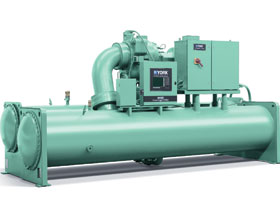Johnson Controls helps minimise risk
February 2015
IT in Manufacturing

The refrigeration equipment used to store and preserve perishable goods is a vital component of any food business. Failure of this equipment can be catastrophic, making reliability non-negotiable. This has seen the emergence of new solutions that measure and monitor the performance of refrigeration equipment in real time, alerting business owners to potential malfunction.
“This equipment is typically a high value asset and owners will almost certainly have scheduled maintenance plans in place,” says Neil Cameron of Johnson Building Efficiency. “However, depending on the environment and the application, scheduled maintenance may not be sufficient to prevent failure. Globally, this risk is being addressed by the emergence of new software driven solutions. They leverage the data communications capabilities built into refrigeration equipment to monitor equipment performance and provide early notifications of anomalies. This can avert disaster but also assists owners to proactively plan downtime and maintenance.”
Johnson Controls’ Connected Equipment initiative, which provides 24x7 real-time monitoring and alerts, is a service offered to all its customers. “All you need is an Internet connection to connect the equipment to our server”, notes Cameron.
For older equipment, this may require a simple replacement of controllers. The benefits can be significant, however. “The ability to connect to the Internet (via 3G, Wi-Fi or Ethernet) makes performance data visible, shareable and open to analysis. This unlocks a whole new world of opportunity,” says Cameron.
Continual diagnosis of equipment performance includes measurement of vibration, of temperature deviation, pressure and energy consumption. In addition, with hundreds of thousands of pieces of plant equipment being monitored globally, measurement against industry benchmarks has become possible.
Continual monitoring of equipment is a trend that has become the norm in Europe. With Internet connectivity becoming increasingly ubiquitous, it is expected to become a standard feature of ownership globally. In South Africa, with its hot climate and often harsh environments, it is a welcome opportunity to actively minimise risk.
“Early warning of equipment failure – whether three months or three hours – is invaluable to any business dealing with perishables. Johnson Controls provides regular reports comprising easily comprehended graphs and statistics indicating performance, along with diagnosis of that performance, with alerts where there are deviations or potential areas of concern, or opportunities for tuning and improvements,” concludes Cameron.
For more information contact Neil Cameron, Johnson Controls, +27 (0)11 921 7100, [email protected], www.johnsoncontrols.com
Further reading:
Why choose between Capex and Opex if you can Totex?
Schneider Electric South Africa
IT in Manufacturing
In a sector marked by cyclical demand, high capital intensity, and increasing regulatory and sustainability pressures, mining, minerals and metals (MMM) companies are re-evaluating how they approach procurement and investment.
Read more...
AI and the smart factory
Schneider Electric South Africa
IT in Manufacturing
Imagine walking into a factory where machines can think ahead, predict problems before they happen and automatically make adjustments to realise peak performance. This isn’t science fiction, it’s happening right now as AI continues to transform how we run industrial operations.
Read more...
Why your supply chain should be a competitive advantage
Schneider Electric South Africa
IT in Manufacturing
The last five years have placed unprecedented strain on global supply chains. Leading companies are turning the challenge into an opportunity to transform their supply chains into a competitive advantage.
Read more...
Why AI will never truly understand machines
Wearcheck
IT in Manufacturing
Cutting-edge technology and solutions powered by AI are embraced by specialist condition monitoring company, WearCheck, where the extreme accuracy of data used to assess and diagnose machine health is paramount.
Read more...
Buildings and microgrids for a greener future
Schneider Electric South Africa
IT in Manufacturing
Buildings are no longer passive consumers of power. Structures of almost every size are evolving into dynamic energy ecosystems capable of generating, storing and distributing their own electricity. Forming part of this exciting transformation are microgrids.
Read more...
Traditional data centres are not fit for purpose
IT in Manufacturing
Traditional data centre designs are falling short, with nearly half of IT leaders admitting their current infrastructure does not support energy or carbon-reduction goals. New research commissioned by Lenovo reveals that data centre design must evolve to future-proof businesses.
Read more...
AI agents for digital environment management in SA
IT in Manufacturing
The conversation about artificial intelligence in South Africa has shifted rapidly over the past year. Among the technologies changing the pace of business are AI agents - autonomous, task-driven systems designed to operate with limited human input.
Read more...
AI-powered maintenance in future-ready data centres
Schneider Electric South Africa
IT in Manufacturing
The data centre marketplace often still relies on outdated maintenance methods to manage mission-critical equipment. Condition-Based Maintenance (CBM) is powered by AI and is fast becoming a necessity in ensuring both competitiveness and resilience.
Read more...
Powering up data centre mega development
IT in Manufacturing
Parker Hannifin has secured a major contract to supply key equipment for nearly 30 aeroderivative gas turbines powering a new hyperscale data centre in Texas.
Read more...
Building resilient supply chains through smarter e-procurement
RS South Africa
IT in Manufacturing
In a time of constant disruption, from supply chain uncertainty to rising operational costs, businesses that embrace digital procurement are better positioned to stay competitive and resilient.
Read more...


